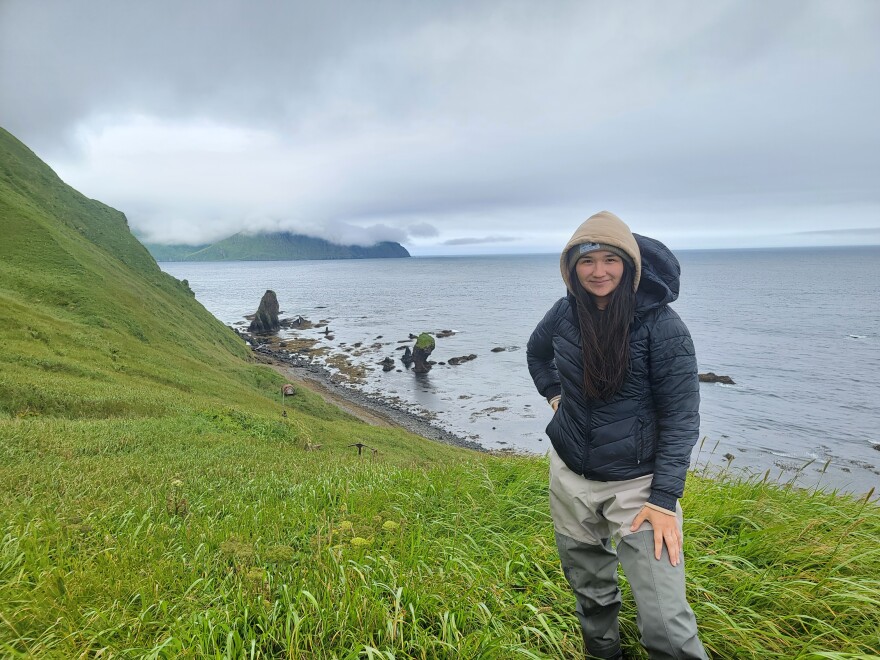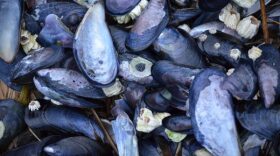The Qawalangin Tribe recently promoted Unalaska local Shayla Shaishnikoff to the role of resilience project manager.
KUCB’s Hope McKenney sat down with Shaishnikoff in late June to discuss how growing up on the island shaped Shaishnikoff’s environmental expertise, the types of issues she’s most concerned about and how tribal knowledge can be used as data in the long run.
TRANSCRIPT:
SHAYLA SHAISHNIKOFF: I grew up here in Unalaska; I'm from here. My parents are from here, their parents are from here. We've been here for a very long time. I work at the Qawalangin tribe as the Resilience Project Manager.
MCKENNEY: What is the Resilience Project Manager? What do you do in that role?
SHAISHNIKOFF: To me, my job in resilience is ultimately to safeguard the subsistence way of life for the Unangan people. I work with the community to find out what concerns might be in the environment related to subsistence foods. We try to get funding for projects that address those things.
MCKENNEY: Has that position existed at the tribe in the past?
SHAISHNIKOFF: The position is fairly new. It did exist before me, but I think since I've taken it on, it's really started to grow.
It’s ultimately an environmental position, but it's so unique in that it's also very cultural. I believe that you can't really separate the two — especially when you're working for a place like a tribe — because when we're working with subsistence, we're working directly with environment and culture. So, protecting that is really my number one objective.
I have held community meetings, I have working groups, I do outreach to elders and knowledge holders to try to collect data in the sense of Indigenous knowledge and local knowledge. We're trying to see what everybody's concerns are, what people's priorities are in terms of subsistence and what we’re seeing in the environment.
A big one that a lot of people are familiar with is the red salmon run. Years ago, our counts out at the weir were in the hundreds of thousands, but for the past few years we've struggled just to get ten thousand, [even] five thousand. So that's been the biggest and most recurrent issue because red salmon is a huge resource for us and something that we’ve relied on.
MCKENNEY: You’re talking about these big issues that are happening. We're having reductions in salmon numbers. We're having algal blooms, the water is warming. We're seeing populations of fish go further north. What are the solutions moving forward?
SHAISHNIKOFF: I currently have a working group that we call the Guustilix̂ Committee. They are a group of local people, knowledge holders, who essentially are consultants for me while I work on a vulnerability assessment. We're looking at things in our environment — it could be salmon, it could be berries, a bug, a bush, or anything really — it could be a keystone species, it could be something very simple. We are looking at all of these different species and assessing their vulnerability to potential change.
MCKENNEY: Tell me a little bit about your background. Why are you doing this work?
SHAISHNIKOFF: I got my first degree in International Studies in Russian language. The idea behind that was, I knew I wanted to help people. I was really interested in the Aleut International Association. They work a lot with Russia and do a lot of work in the Bering Sea and, after that, I realized that I more specifically wanted to work environmentally. So, I went back to school and I got another degree in environmental science and marine ecology. I ended up back home because I realized that my desire to do all this work was rooted here.
MCKENNEY: When did you graduate?
SHAISHNIKOFF: I graduated in June of 2022.
MCKENNEY: You told me a little bit about the current projects you're working on. What's next? What are you hoping to do in this role for the tribe?
SHAISHNIKOFF: A pretty big project, and something that I want to see happen is, something that we really should try to do sooner rather than later, is [working] with elders throughout the entire region to collect region-wide data in the form of Indigenous knowledge.
[We’d] not only collect what they're seeing happening now, but what they might know of the past, if they have stories from their grandparents about conditions that they went through. We want to collect all that and have it because it's crazy to think that we really don't have a huge baseline of data — Western data here in Unalaska — especially since we are so critical for the shipping industry and the fishing industry, but we just don't have that baseline. Collecting that baseline in the form of Indigenous knowledge and Western data is at the forefront of what we're doing right now.
In the meantime, we're also working on some capacity building plans, like the vulnerability assessment. We also just completed the climate adaptation plan. That one really will help us map out where we're going in the future as well.
MCKENNEY: My understanding is that this kind of research, knowledge gathering and data gathering is happening locally right now. But the thought is to — if I'm understanding this correctly — expand throughout the entire Aleutian and Pribilof region?
SHAISHNIKOFF: Right. When we can go out to other islands and do other work, where it's possible, we would love to do that. But we'd also just really love to partner with other tribes in the region. We've already done a lot of work with the Aleut Tribe of St. Paul. We’re also collaborating with APIA on a regional climate adaptation plan template so that other communities in the region can work on the same things. Hopefully in the long run, we'll all be working together and be able to identify trends that are happening throughout the whole region.
MCKENNEY: Why now? What is the importance of what you're doing in this role at this moment?
SHAISHNIKOFF: We are seeing so many changes so quickly. Like I said, the red salmon is a huge indicator. It's a shock to everybody. We don't know what's happening. We're also seeing spikes in paralytic shellfish poisoning, which is caused by algal blooms. With all these changes that definitely affect our subsistence way of life. We don’t know, maybe things will bounce back, maybe they won't, but we need to be prepared.






